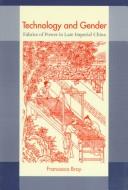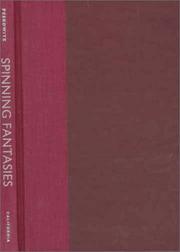| Listing 1 - 2 of 2 |
Sort by
|

ISBN: 0585104336 0520919009 9780520919006 9780585104331 9780520206854 0520206851 9780520208612 0520208617 0520206851 0520208617 Year: 1997 Publisher: Berkeley ; Los Angeles, California : University of California Press,
Abstract | Keywords | Export | Availability | Bookmark
 Loading...
Loading...Choose an application
- Reference Manager
- EndNote
- RefWorks (Direct export to RefWorks)
In this feminist history of eight centuries of private life in China, Francesca Bray inserts women into the history of technology and adds technology to the history of women. Bray takes issue with the Orientalist image that traditional Chinese women were imprisoned in the inner quarters, deprived of freedom and dignity, and so physically and morally deformed by footbinding and the tyrannies of patriarchy that they were incapable of productive work. She proposes a concept of gynotechnics, a set of everyday technologies that define women's roles, as a creative new way to explore how societies translate moral and social principles into a web of material forms and bodily practices.Bray examines three different aspects of domestic life in China, tracing their developments from 1000 to 1800 A.D. She begins with the shell of domesticity, the house, focusing on how domestic space embodied hierarchies of gender. She follows the shift in the textile industry from domestic production to commercial production. Despite increasing emphasis on women's reproductive roles, she argues, this cannot be reduced to childbearing. Female hierarchies within the family reinforced the power of wives, whose responsibilities included ritual activities and financial management as well as the education of children.
Sex role --- Women --- Technology --- Applied science --- Arts, Useful --- Science, Applied --- Useful arts --- Science --- Industrial arts --- Material culture --- History. --- Social conditions. --- Social aspects --- China --- Social conditions --- adds technology to history of women. --- concept of gynotechnics. --- domestic production to commercial production. --- eight centuries. --- feminist interpretation. --- history of private life in china. --- inserts women into history of technology. --- shell of domesticity. --- textile industry. --- the house. --- three aspects of domestic life. --- womens reproductive roles.

ISBN: 0520919491 0585130914 9780520919495 9780585130910 9780520209671 0520209672 0520208315 0520209672 Year: 1997 Publisher: Berkeley, California : University of California Press,
Abstract | Keywords | Export | Availability | Bookmark
 Loading...
Loading...Choose an application
- Reference Manager
- EndNote
- RefWorks (Direct export to RefWorks)
Miriam Peskowitz offers a dramatic revision to our understanding of early rabbinic Judaism. Using a wide range of sources--archaeology, legal texts, grave goods, technology, art, and writings in Hebrew, Aramaic, Greek, and Latin--she challenges traditional assumptions regarding Judaism's historical development. Following the destruction of the Jerusalem Temple by Roman armies in 70 C.E., new incarnations of Judaism emerged. Of these, rabbinic Judaism was the most successful, becoming the classical form of the religion. Through ancient stories involving Jewish spinners and weavers, Peskowitz re-examines this critical moment in Jewish history and presents a feminist interpretation in which gender takes center stage. She shows how notions of female and male were developed by the rabbis of Roman Palestine and why the distinctions were so important in the formation of their religious and legal tradition. Rabbinic attention to women, men, sexuality, and gender took place within the "ordinary tedium of everyday life, in acts that were both familiar and mundane." While spinners and weavers performed what seemed like ordinary tasks, their craft was in fact symbolic of larger gender and sexual issues, which Peskowitz deftly explicates. Her study of ancient spinning and her abundant source material will set new standards in the fields of gender studies, Jewish studies, and cultural studies.
Sex in rabbinical literature --- Women in rabbinical literature --- Textile crafts in rabbinical literature --- Rabbinical literature --- Sex role --- Judaism --- Religion --- Philosophy & Religion --- Gender role --- Sex (Psychology) --- Sex differences (Psychology) --- Social role --- Gender expression --- Sexism --- Hebrew literature --- Jewish literature --- Women in the Talmud --- History and criticism --- Religious aspects --- Gender roles --- Gendered role --- Gendered roles --- Role, Gender --- Role, Gendered --- Role, Sex --- Roles, Gender --- Roles, Gendered --- Roles, Sex --- Sex roles --- Sex in rabbinical literature. --- Textile crafts in rabbinical literature. --- Women in rabbinical literature. --- History and criticism. --- Judaism. --- challenges traditional assumptions. --- classic form of religion. --- critical moment in jewish history. --- destruction of jerusalem temple. --- feminist interpretation. --- judaisms historical development. --- new incarnations of judaism. --- rabbinic judaism. --- rabbis of roman palestine. --- study of ancient spinning. --- understanding of early rabbinic judaism.
| Listing 1 - 2 of 2 |
Sort by
|

 Search
Search Feedback
Feedback About UniCat
About UniCat  Help
Help News
News